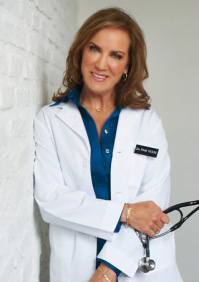
by guest blogger Pam Peeke, MD, MPH, FACP, FACSM, best-selling author and expert on health, fitness, and nutrition
What thoughts and feelings do the word “elderly” conjure for you? Perhaps you immediately envision a frail man or woman in his or her 80s or 90s living with chronic disease and cognitive impairment. How many of you have a negative connotation of the term? What does it really mean to be elderly?
Turning to the experts, the World Health Organization declares that many developed nations regard anyone with the chronological age of 65 years as elderly; the United Nations generally uses a base of 60 years in referring to the world’s older population. Elder age has, historically, been a moving target. As far back as 1875, British lawmakers crafted a definition of old age as “any age after 50,” which was quickly amended to 60 to 65 to accommodate emerging pension plan requirements. Dictionary sources describe elderly as “aged, old, advanced in years, past one’s prime, showing of age.”
Any self-respecting Baby Boomer reading this would be horrified—60 is elderly? Heck, no. Not me! Here’s the good news. You may actually be quite correct after all. There is a big difference between the number of years you live, or life span, and the number of years you live in optimal health, or health span. Researchers are in the process of studying men and women who are at least 85 years of age who have lived long lives devoid of chronic disease, with the exception of arthritis, which is ubiquitous in people 70 years and older. These people have a very long health span.
Eric Topol, MD, a Scripps Health geneticist, refers to these extraordinary people as the “wellderly.” The Wellderly Study began in 2008 as a collaboration between Scripps Health and Scripps Research Institute. To date, Topol and his team have collected more than 1,400 genetic samples from a wellderly population sample drawn from the San Diego area, but soon expanding to a national base. This participant data is now available to other scientists as a DNA dataset called the Scripps Wellderly Genome Resource, and it houses invaluable information for comparing the wellderly to their peers with disease.
The long-term goal of the Wellderly Study is to discover the protective mechanisms these gold-medal winners of aging seem to possess to counteract their innate genetic vulnerabilities to a wide spectrum of diseases. While they somehow deflect these conditions, others their age suffer from them. So, instead of studying people with disease, these researchers are focusing on what actually keeps certain individuals so healthy for such a long time. In doing so, they hope to uncover solutions that nature has provided to protect against disease.
Initial findings from an analysis of the wellderly group’s genes has revealed a higher-than-normal presence of genetic variants that seem to offer protection from long-term cognitive impairment and from chronic diseases, including cancer, heart disease, and diabetes. What’s really fascinating about the study is that there is no one silver bullet. Instead, scientists have discovered many weaker signals from gene sites that should normally increase the vulnerability to disease, hinting at the presence of that elusive biological protective machinery.
While we’re waiting on more great science to be published, there’s plenty you can do right now to optimize your own healthy aging process. So, let’s first reframe the aging process and start to thrive.
- Aim to be wellderly. I’m bagging the term elderly and taking the liberty of redefining this whole aging process vernacular. There appear to be at least three subgroups of wellderly.
- The Super Wellderly: The Super Wellderly includes people who are 80+ and are devoid of chronic disease except arthritis.
- The Wellderly: A Wellderly person is anyone 80+ years old who is living life to the fullest as best he or she can despite the presence of chronic health conditions. Wellderly is a much more positive, hopeful, and empowering term than elderly. Start practicing saying this now: “Yes, I’m 80 and quite wellderly, thank you!” or “I plan on being one of the wellderly one day.” How does that sound?
- The Thrive Well: If you’re under the age of 80 and are enjoying good health, then you’re a member of the Thrive Well. Or you’d better be aiming at that as your goal! Using terms like “old” and “aged” in reference to someone who is 60 doesn’t fit anymore. The Baby Boomers have changed all of that, insisting that 60 is the new 50—and acting like it, as well. With better health care, more attention to mental and physical fitness, and greater dissemination of new science-based ways to age optimally, no wonder a growing number of older men and women are well and thriving. Yes, many have aches and pains and have survived tough disease challenges. But, relative to their unique circumstances, they can still be well and thrive. That’s the goal at any age.
- Focus on achieving a long health span. The goal is not to live long—that’s the life span, which is the number of years you live—rather, it’d to focus on living the longest and most joyful health span possible. Health span years are ones characterized by independent, vibrant, joyful, satisfying, and vital living, either devoid of impairment or with minimal impairment as a result of disease or disability. It’s all relative. The key is to live life to the fullest as you define it.
- Practice a healthy lifestyle. You know the drill by now. Mental, spiritual, and physical fitness are of paramount importance if you’re going to live long and well. Wherever you are on your journey, from beginner to master, the key is to keep up your daily practice of nourishing mind and body, continuously creating new challenges and seeking new adventures. That’s the essence of thriving, not just surviving.
- Get real. No one—not even the Super Wellderly—escapes aches and pains, sagging body parts, creaky joints, fading vision, and diminished energy. The good news is that if you’re taking optimal care of yourself, you’ll more likely experience less of this age-related mind-body impact. Ditch the “antiaging” hype and embrace the realistic, rewarding goal of augmenting and supporting an optimal aging process.
Finally, express gratitude every time you wake up and realize that you’re still here to thrive and continue this awesome adventure of life.
 Pamela M. Peeke, MD, MPH, FACP, FACSM, is an internationally renowned expert in integrative and preventive medicine. Dr. Peeke is a Pew Foundation Scholar in nutrition and metabolism, assistant professor of medicine at the University of Maryland, and a fellow of the American College of Physicians and American College of Sports Medicine. A nutrition and fitness pioneer, she has been the recipient of numerous fitness-industry lifetime achievement awards, including the IDEA Health and Fitness Association Inspiration Award and the Zumba Fitness International Role Model Award. Known as “the doc who walks the talk,” Dr. Peeke is a Senior Olympic triathlete and a member of the National Senior Games Foundation Board. As senior advisor to the 18th Surgeon General of the U.S., Regina Benjamin, MD, MBA, Dr. Peeke created the Surgeon General’s Walks for a Healthy and Fit Nation program. Dr. Peeke’s work includes WebMD’s lifestyle expert, Discovery Health TV’s chief correspondent for nutrition and fitness, host of both Discovery Health TV’s series Could You Survive? and National Body Challenge, acclaimed TEDx presenter, and regular commentator for the national networks. Dr. Peeke is a New York Times best-selling author; her books include Fight Fat after Forty, Body for Life for Women, and The Hunger Fix.
Pamela M. Peeke, MD, MPH, FACP, FACSM, is an internationally renowned expert in integrative and preventive medicine. Dr. Peeke is a Pew Foundation Scholar in nutrition and metabolism, assistant professor of medicine at the University of Maryland, and a fellow of the American College of Physicians and American College of Sports Medicine. A nutrition and fitness pioneer, she has been the recipient of numerous fitness-industry lifetime achievement awards, including the IDEA Health and Fitness Association Inspiration Award and the Zumba Fitness International Role Model Award. Known as “the doc who walks the talk,” Dr. Peeke is a Senior Olympic triathlete and a member of the National Senior Games Foundation Board. As senior advisor to the 18th Surgeon General of the U.S., Regina Benjamin, MD, MBA, Dr. Peeke created the Surgeon General’s Walks for a Healthy and Fit Nation program. Dr. Peeke’s work includes WebMD’s lifestyle expert, Discovery Health TV’s chief correspondent for nutrition and fitness, host of both Discovery Health TV’s series Could You Survive? and National Body Challenge, acclaimed TEDx presenter, and regular commentator for the national networks. Dr. Peeke is a New York Times best-selling author; her books include Fight Fat after Forty, Body for Life for Women, and The Hunger Fix.




No comments yet.